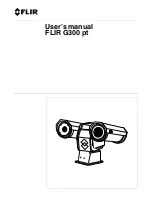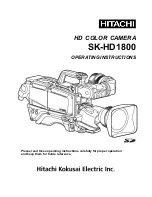
www.bullard.com
Bullard T4MAX Thermal Imager
User Manual
Strap Assemblies
Side Straps
The side straps are designed to be field replaceable. Users can order replacements and install
them without having to return the thermal imager to the factory.
removing/Installing the Side Straps
To remove either of the right or left side straps,
loosen the strap and pull it through the strap loop
located on either side of the LCD display (
Figure
5).
Remove the screw that holds the strap to the
imager. To install, fasten the strap to the unit using
the screw provided. Do not over-tighten. Feed the
strap through the strap loop and adjust to the
desired length.
Adjusting the Side Straps
To adjust a side strap, loosen the hook and loop and
set to the desired length.
Combination Strap
The combination strap
(Figure 6)
can be used either as a wrist strap to keep the
imager from falling if it should slip from your hand, or as a gear strap, hooked directly onto
your turnout gear or SCBA. As a wrist strap, the adjustable strap fits over the sleeve of your
turnout gear and can adjust to any size wrist. The strap can be easily attached to either D-ring
located on the thermal imager. As a gear strap, the strap can be attached to a D-ring on your
turnout gear or SCBA and to a D-ring on the thermal imager. A quick release buckle serves
as a safety release mechanism in case the thermal imager ever becomes lodged inhibiting
movement. Simply depress the buckle and the thermal imager releases from the strap.
Care Instructions
The Bullard T4MAX Thermal Imager requires little maintenance. For best results, after each
use:
• Clean the outside of the unit with mild soap or detergent.
• Wipe the lens with a soft cloth.
• Clean the display with a soft cloth.
• Check screw tightness on side straps and cover display
• Store your thermal imager in the optional truck mount or in the delivery case provided.
• All thermal imagers should be maintained using a proper program.
Cleaning the Lens
The Bullard T4MAX lens is recessed in an impact resistant bezel. The lens can be cleaned
with a soft cloth and soapy water as required.
replacing the Video Display Cover Window
The display cover
(Figure 7)
has a scratch resistant
hard coating to minimize marring. However, if heavy
scratching or gouging does occur, the cover window can
be replaced. To do this, simply remove the six screws
along the top, bottom, and sides of the window. Remove
the plastic display cover window and replace with a new
one (part number T4WINDOW) making sure that the
countersink slots around the mounting holes are facing outward.
Do not over-tighten.
Service
If your Bullard Thermal Imager is not performing properly, please contact Bullard Customer
Service at 877-BULLARD (285-5273). Outside the US & Canada, call 1-859-234-6611. Describe
the problem to the Bullard representative as completely as possible. For your convenience,
your representative will try to help you diagnose or correct the problem over the phone.
Before returning your Bullard Thermal Imager, you should verify with your representative
that the product should be returned to Bullard. Bullard Customer Service will provide you with
written permission and a return authorization number.
If the return is a non-warranty repair, a Bullard Customer Service Representative or your
local distributor will provide you with a repair invoice estimate. To authorize repair, you must
provide a purchase order to your distributor for the amount of the estimate. Once Bullard
receives authorization from your local distributor, we will issue you a return authorization
number so that you can return the unit to Bullard. Bullard will repair the unit and ship it from
our factory within 48 business hours. If the cost of repairs exceeds the stated quote by more
than 15% or by more than $100, a Bullard representative will re-estimate your repair and
your local distributor will contact you for authorization to complete repairs. After repairs are
completed and the goods have been returned to you, your distributor will invoice you for the
actual repair amount.
NoTe
Do not attempt to disassemble the sealed case of your Bullard -- Thermal Imager. If the unit is
not functioning properly, return it to Bullard (as described in the Service section) for evaluation.
Disassembling the unit voids all warranties.
Prior to returning your Thermal Imager, decontaminate and clean your Thermal Imager
to remove any hazardous or contaminated materials that may have settled on the product
during use. Laws and/or shipping regulations prohibit the shipment of hazardous or
contaminated materials. Products suspected of contamination will be professionally
decontaminated at the customer’s expense.
Returned products will be inspected upon return to the Bullard facility. If the repair is under
warranty, Bullard will repair the unit and ship it from our factory within 48 business hours.
Figure 5
Figure 7
Side Strap
Figure 6
Strap Loop
CAUTIoN
Do not use solvents or paint thinners to clean your Bullard T4MAX Thermal Imager as they
could permanently mar the surface or degrade the protective properties of the casing.
Do not intentionally submerge the unit underwater or subject the unit to high pressure
water. Follow care instructions described above.
Failure to observe these instructions may result in product damage. Any damage caused by
improper care is not covered under warranty.
WArNINg
The T4MAX thermal imager is extremely sensitive to intense, radiant heat sources. Never
point the T4MAX at the sun or any other source of extreme radiant heat, as this could
severely damage the thermal imager.
WArNINg
Do not attempt to disassemble the Bullard T4MAX Thermal Imager. If the unit is not
functioning promptly return it to Bullard for evaluation. Disassembling the unit voids all
warranties.
Like all thermal imagers sold at the time of this printing, the Bullard T4MAX is not certified
as intrinsically safe. Do not attempt to remove the lens gasket or the rear boot. These
parts provide sealing and removal will break the seal exposing the unit to potential water
damage. Failure to follow these instructions could result in death, serious injury and/or
product damage.
Thermal Imaging is not a technology designed to replace current fire fighting tactics.
Rather, it is a tool that allows the firefighter to be more effective and to make better
decisions.
Firefighters cannot stop using basic firefighter safety tactics. All firefighters should
receive proper training on: how thermal imagers work; the uses and limitations of thermal
imagers; image interpretation; and the safety considerations for thermal imaging use.






















